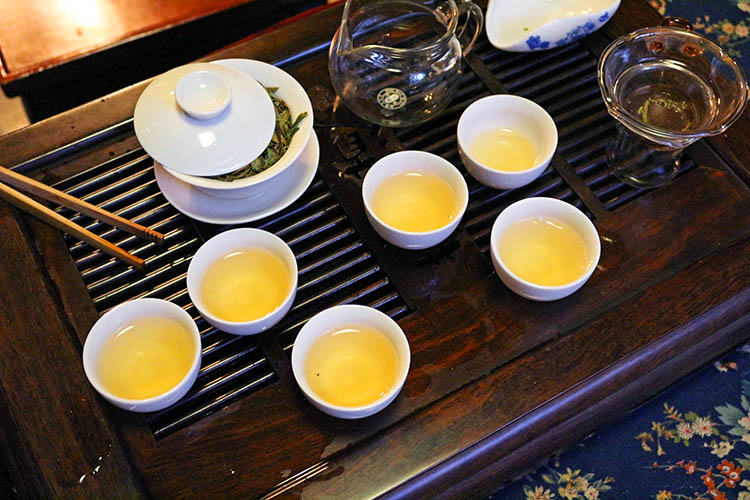
Tea's popularity in Chengdu is not just down to its location in one of the biggest tea producing regions in China, but also because of its historically advantageous position.
Sichuan was endowed with fertile farmlands after the Dujiangyan Irrigation System was built in 256BC and, thanks to long periods of peace, this “Land of Abundance” provided locals with centuries of the good life.
Tea appreciation began with the upper classes. Wealthy gentlemen would gather with their scholarly friends to compare rare birds, create poetry and sample fine teas. This way of life filtered through the classes, and tea became common courtesy. Teahouses have also had a long reign in Chengdu. There's little record of how they began, but by the Tang dynasty (618–907 AD), there were more than 400 teahouses in Chengdu. It was around this time that Sichuan became an importer of tea, sourcing from the neighbouring province of Yunnan via the Ancient Tea Horse Road.
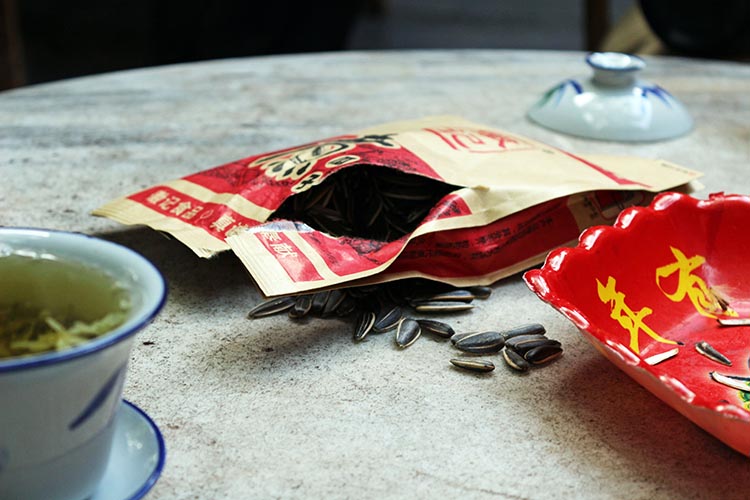
Tea tasting is serious business and best done in groups of no more than four people. The tea must be prepared according to a recipe that?dictates the quantity of tea, temperature of water, the length of steeping and sometimes the equipment. During?the tasting, you examine the quality of the leaves, the colour of the liquid, the intensity of the aroma, the texture of the brew and the profile and clarity of the flavour. And then again after subsequent steeps. A tea leaf's quality is not only indicated by its genus, its region and method of production or size, but also the time of the year that it's harvested. The leaves collected before Qingming, a festival in April each year, are nearly always considered to be superior, as the buds are tighter giving better mouthfeel. Well proportioned leaves don't always produce great teas and those that lose their flavour within three steeps are considered low quality. Of course you can be as strict, or not, as you like.
As a guest, you should wait to be offered tea. In a teahouse, the etiquette varies according to the type of tea you're drinking and the equipment you're using, though it's generally fairly relaxed. Some teahouses will offer tea-serving equipment to avoid handling the leaves, so you should use those. Drinking from a gai wai, a china cup with lid and saucer, has its own set of rules. Here, as the leaves are in your cup, you should use the rim of the lid to move the leaves away from you when you drink, always holding the cup by the saucer. Leaving the lid partially on the cup indicates that you are ready for a refill. If you don't want any more tea, place your left hand over the closed lid when you're offered more hot water.
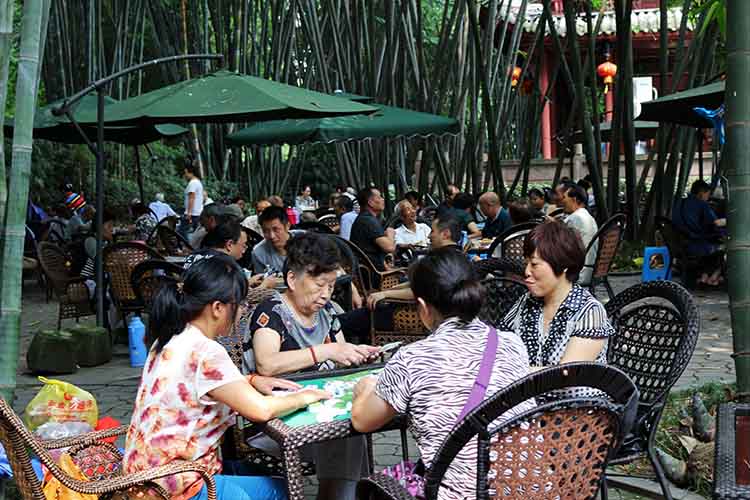
Decades ago, tea houses were places where people watched live performances with friends and family. Though the comedians and opera singers have been replaced with games of mah-jong, their social function has stayed much the same. Today, Chengdu has many ultra-modern and service-orientated establishments, often used for business meetings, as well as more informal spaces that are popular with families. Prices vary from place to place and according to the tea you're drinking, but they can start from as little as ?10 (US$1.60) per person. If you're looking for a traditional affair, riverbanks and parks are your best bet. Here, for around ?20 (US$3.25), you can spend a whole day drinking tea and playing mah-jong, with lunch included. Some of these will also allow you to bring your own tea, in which case you will only be charged around RMB$2 (US$0.30) for hot water. A service charge or tip is rarely?required.
Specialises in seasonal, high quality teas for tasting and for retail. There is a set room hire rate (it doesn't matter how many of your there are), plus the cost of the tea. It's the place to go for serious tea appreciation with the use of traditional tea tasting and serving equipment.
209 Qingyang Dadao, Qingyang District; 青羊区青羊大道,俗味茶号
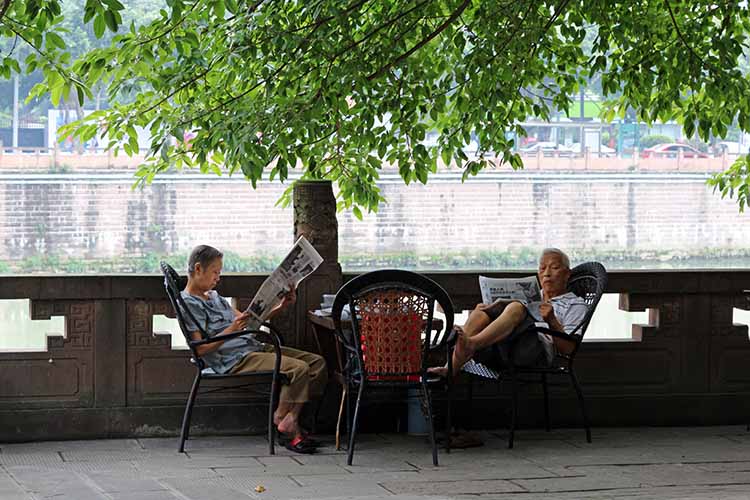
There are four different tea houses in this former zoo, all operated by the park. Baihuayuan is the most picturesque, set in a pavilion under the shelter of trees. All four offer tea, mah-jong rental and lunch for ?18 (US$2.90) per person, per day.
175 Xi Yiduan, Yihuan Lu, Qingyang District; 青羊区一环路西一段,百花潭公园
To the left of Jinjiang Theatre's main building is Yuelai Tea House, where you can watch performances of Sichuan opera every Saturday night (except the first of the month). Prices start from ?20 (US$3.25), which includes?a two-hour performance and tea. You can also go at other times of the day, when teas start from ?10 (US$1.60).
54 Huaxing Zhengjie, Jinjiang District; 锦江区华兴正街54号锦江剧场内,悦来茶馆
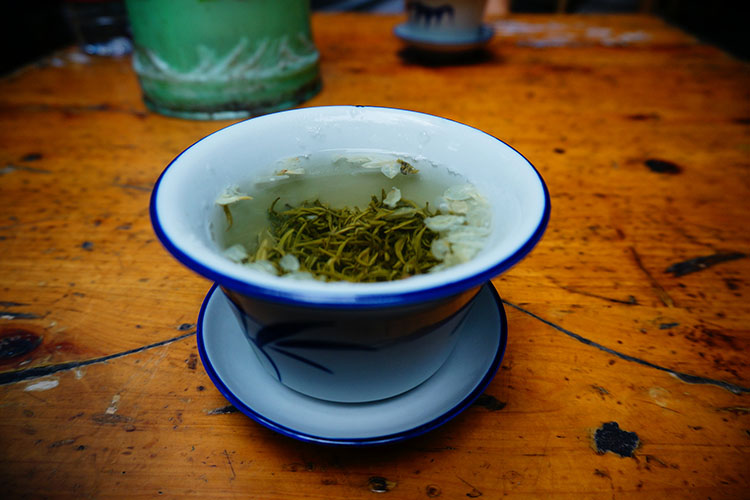
Perhaps one of the most famous tea houses in Chengdu, Heming Teahouse is situated in the centre of People's Park. It has over 100 years of history and you can still get water poured from traditional long-spouted teapots for an additional fee. Teas start from ?18 (US$2.90).